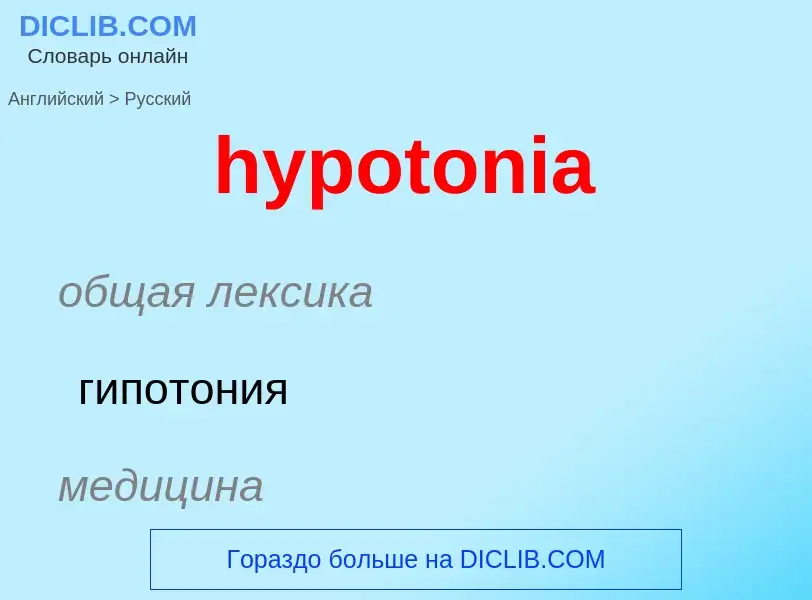Traducción y análisis de palabras por inteligencia artificial
En esta página puede obtener un análisis detallado de una palabra o frase, producido utilizando la mejor tecnología de inteligencia artificial hasta la fecha:
- cómo se usa la palabra
- frecuencia de uso
- se utiliza con más frecuencia en el habla oral o escrita
- opciones de traducción
- ejemplos de uso (varias frases con traducción)
- etimología
hypotonia - traducción al ruso
общая лексика
гипотония
медицина
гипотония (уменьшенный тонус мышцы)
медицина
болезнь Оппенгейма
врождённая миатония
миатония Оппенгейма
медицина
вялый (гипотоничный) ребёнок
Wikipedia
Hypotonia is a state of low muscle tone (the amount of tension or resistance to stretch in a muscle), often involving reduced muscle strength. Hypotonia is not a specific medical disorder, but a potential manifestation of many different diseases and disorders that affect motor nerve control by the brain or muscle strength. Hypotonia is a lack of resistance to passive movement, whereas muscle weakness results in impaired active movement. Central hypotonia originates from the central nervous system, while peripheral hypotonia is related to problems within the spinal cord, peripheral nerves and/or skeletal muscles. Severe hypotonia in infancy is commonly known as floppy baby syndrome. Recognizing hypotonia, even in early infancy, is usually relatively straightforward, but diagnosing the underlying cause can be difficult and often unsuccessful. The long-term effects of hypotonia on a child's development and later life depend primarily on the severity of the muscle weakness and the nature of the cause. Some disorders have a specific treatment but the principal treatment for most hypotonia of idiopathic or neurologic cause is physical therapy and/or occupational therapy for remediation.
Hypotonia is thought to be associated with the disruption of afferent input from stretch receptors and/or lack of the cerebellum’s facilitatory efferent influence on the fusimotor system, the system that innervates intrafusal muscle fibers thereby controlling muscle spindle sensitivity. On examination a diminished resistance to passive movement will be noted and muscles may feel abnormally soft and limp on palpation. Diminished deep tendon reflexes also may be noted. Hypotonia is a condition that can be helped with early intervention.

